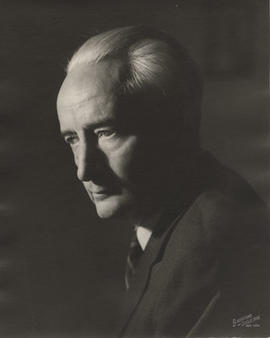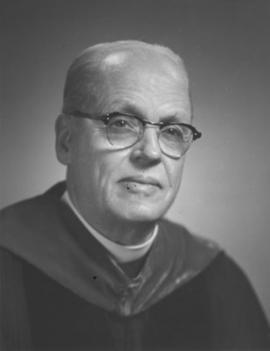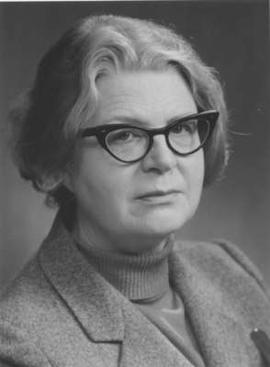Gotthard Booth (1899-1975) was a medical doctor specializing in the practice of psychiatry concerned with chronic physical diseases, psychosomatic medicine, and studies in the relationship between religion and health. Born in Nuremberg, Germany, Booth graduated from the University of Munich Medical School in 1923, and in the early 1930s moved to the United States. He resided in Westport, Connecticut but maintained a practice in New York City. Booth taught at Columbia University from 1945 to 1953, was instructor for one year at the New York Medical College, and from 1962 was consulting psychiatrist for the Union Theological Seminary, New York. In 1965 he became a visiting lecturer at Waterloo Lutheran University (now Wilfrid Laurier University) and its federated college, Waterloo Lutheran Seminary. A fellow of the American Psychiatric Association, Booth's research resulted in the publication of more than 60 articles. He worked as a research associate with the New York Psychiatric Institute for ten years. He was also a member of the American Psychosomatic Society, the Academy of Psychosomatic Medicine, the New York County Medical Society, and the American Medical Association.
J. Ray Houser (1897-1981) was a Lutheran pastor, and President of Waterloo Lutheran Seminary in Waterloo, Ontario. Houser was educated at Gettysburg College and Mt. Airy Theological Seminary, Philadelphia. After his ordination in 1924 he served as a pastor in the United States. In 1954 he became President of Waterloo Lutheran Seminary, serving until his retirement in 1968.
In 1910 the Canada Synod and Synod of Central Canada of the Lutheran Church entered into an agreement to establish a Lutheran Seminary. Though the location first proposed for the Seminary was Toronto, Waterloo was selected when its citizens offered a tract of land on the boundary of the town. The choice of location was affected, too, by the fact that the majority of Lutherans in Ontario lived in the vicinity of Waterloo and Berlin (Kitchener). In 1911 the Evangelical Lutheran Seminary of Canada opened its doors.
Facilities for pre-theological education were established in 1914 with courses leading to senior matriculation given in Waterloo College School.
In 1924 the Waterloo College of Arts, providing courses in post-secondary education in a four year program, was established. In 1925 the Faculty of Arts, under the name of Waterloo College, affiliated with the University of Western Ontario. Waterloo College soon began to offer Honours degree programs in the arts.
The affiliation with the University of Western Ontario ended in 1960 when the Seminary obtained a revised charter changing the name of the institution to Waterloo Lutheran University.
On November 1, 1973, Waterloo Lutheran University became Wilfrid Laurier University, one of Ontario's provincially assisted universities after Bill 178 was given Royal Assent by the Lieutenant Governor, former Wilfrid Laurier University Chancellor William Ross Macdonald.
Nils Willison (1880-1964) was a Lutheran pastor, professor and administrator. Willison graduated from the University of Toronto in 1908, received a BA from Queens University, and was the first graduate of Evangelical Lutheran Seminary (now Waterloo Lutheran Seminary) in 1914. He was a professor at Waterloo College from 1918-1928, and also served as Registrar. From 1928-1936 Nils Willison was pastor of Trinity Lutheran Church, Hamilton. He was President and Dean of the Lutheran College and Seminary in Saskatoon, Saskatchewan, from 1936-1949. Willison returned to Ontario in 1949 and served as pastor of the Owen Sound-Wiarton parish until 1952. He was a member of the Board of Governors of Waterloo College and Seminary for 12 years. The University of Western Ontario granted Nils Willison an honorary Doctor of Divinity degree in 1944. Wilfrid Laurier University’s Willison Hall is named in his honour.
John Jackson (1947 - ) is an environmental activist in Ontario, Canada. Jackson received his BA from the University of Waterloo in 1969. He is a researcher, project director, advisor, chair and coordinator of numerous environmental agencies. Jackson served as President of the Ontario Toxic Waste Research Coalition, a citizens' and agricultural group which succeeded in halting the Ontario Waste Management Corporation's plans to build a hazardous waste plant in West Lincoln in the Niagara Peninsula. In recognition of his leadership, John Jackson was presented a scroll by the Member of Provincial Parliament for the Riding of Lincoln.
Flora Roy (1912-2008) was a professor at Wilfrid Laurier University in Waterloo, Ontario from 1948 until 1993. Roy received her BA and MA from the University of Saskatchewan and her PhD from the University of Toronto. In 1948 she became a professor in the English Department at Waterloo College (now Wilfrid Laurier University), and served as Department Chair for 30 years. Roy retired from full time teaching in 1978 but continued to teach on a part-time basis until 1993. She received the Confederation Medal in 1967, Queen Elizabeth II Jubilee Medal in 1978, Wilfrid Laurier University Language Arts Award in 1984, and the Wilfrid Laurier University Alumni Association Distinguished Educator award in 1995. In 1988 Flora Roy received an honorary degree from Wilfrid Laurier University.
Established in 1975, the Faculty of Music delivers music education and related activities at Wilfrid Laurier University. As of 2013, undergraduate degree options include an Honours Bachelor of Music (BMus) degree and an Honours Bachelor of Music Therapy (BMT) degree. The faculty also offers Master of Music Therapy and Master of Arts in Community Music degrees. In addition to the degree programs, there are several supplementary and post-graduate options including three diploma programs, a practicum program and a management option. The Faculty of Music invites guest artists from around the world to contribute to the course offerings and hosts a number of affiliated artists, beginning in 1967 with Peter van Ginkel. Every year the faculty produces a number of concerts and recitals of traditional, new and original music. The concerts showcase the talents of WLU students and special guests in a variety of styles and forms including jazz, opera and orchestra.
The institution’s involvement with music dates back to first half of the 20th century when it was known as Waterloo College. Initially, musical activities at the college were the domain of student groups such as the college choir and the glee club. In the years following World War II the interest in music had grown at the college. There was an annual student musical known as the Purple and Gold review and the college choir led by Dr. Ulrich Leupold regularly toured the parishes of Southern Ontario. In 1945 Dr. Leupold established the Department of Music with the class Music10. By 1956 the college offered two courses in music history and theory, as well as one course on church music. In 1965 a music program was formally created by Dr. Walter Kemp. This new program allowed students to earn a Bachelor of Arts with a major in music. In 1969, a new three-year Bachelor of Music degree was introduced and was to commence in 1970.
The Music Department remained affiliated with the Faculty of Arts for the next five years. Traditionally, the department held classes in the chapel and in a music room in the Arts Building. However, these facilities did not suit department’s needs and in 1971 classes were moved into two houses on Bricker Street. Due to noise complaints from neighbouring residents, the music department was soon asked to vacate the houses. The department was then moved into the garage of the President’s House (Alumni Hall). On May 1st, 1975 the Department of Music became the Faculty of Music. Dr. Christine Mather was named the first Dean and was inducted on November 3, 1975. That same year, the Faculty of Music was moved to Macdonald House. In 1979, Dr. Gordon Greene became Dean and held the position for two consecutive terms. In 1988 the Faculty was moved to the newly constructed John Aird Centre, which contains the Maureen Forrester Recital Hall, the Theatre Auditorium, classrooms, practice rooms and offices. This purpose-built centre remains as the current home of the Faculty of Music. In 1989, Anne Hall was appointed Dean. Other Deans of the Faculty of Music include Dr. Charles Morrison (Appointed in 2000) and Dr. Glen Carruthers (Appointed in 2010).
Jim Stapleton was a student at Waterloo Lutheran University (now Wilfrid Laurier University) from 1961 to 1965.
Emily Howard Jennings Stowe (1831-1903) was a teacher and principal, a medical doctor, and a suffragette. Educated at home, Stowe became a teacher in 1846 and graduated from the Provincial Normal School in Toronto, Canada West in 1854. In 1865 Stowe applied to study medicine at the University of Toronto, but was denied entry because she was a woman. Unable to pursue her education in Canada, she attended the New York Medical College for Women. After graduating in 1867, Stowe returned to Toronto to practice medicine without a license. In 1870 she was allowed to attend the University of Toronto and was granted a medical license in 1880. In 1877 Emily Stowe organized Canada's first suffrage organization, initially called the Toronto Women's Literary Club, which later became the Toronto Women's Suffrage Club.
Ann Augusta Stowe-Gullen (1857-1943) was a medical doctor, a lecturer and a suffragette. She was born in Mt. Pleasant, Ontario, the daughter of John Stowe and Emily Howard Jennings. She married John Benjamin Gullen in 1883. She died in Toronto. Stowe-Gullen was educated at the Toronto School of Medicine, then at the Faculty of Medicine at Victoria University, Toronto, where she became an M.D. in 1883, the first woman to graduate from a Canadian medical school. Immediately after graduating she was appointed Demonstrator in Anatomy at the Woman’s Medical College in Toronto (from 1894 onwards known as the Ontario Medical College for Women). In 1890 she was appointed Lecturer on Diseases of Children, subsequently Professor of Diseases of Children. She also served among the original staff members of Toronto Western Hospital (founded in 1896). Stowe-Gullen was a member of the Ontario College of Physicians and Surgeons, the Ontario Social Service Council, the Senate of the University of Toronto where she represented women in the medical profession (1912-24), the Toronto Board of Education (1892-96), the University Women's Club, the Women's Art Association, the Women's Board at Toronto Western Hospital, and the Women's Canadian Club. She was also active in the suffrage, temperance and other social movements. She was among the founders of the National Council of Women in 1893, (President) of the Canadian Suffrage Association, (Vice-President) of the National Council of Women, and she succeeded her mother as President of the Dominion Women’s Enfranchisement Association in 1903. In 1935 she was awarded the Order of the British Empire.


